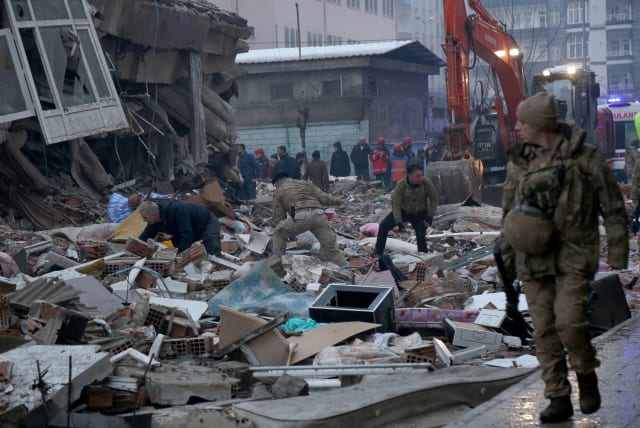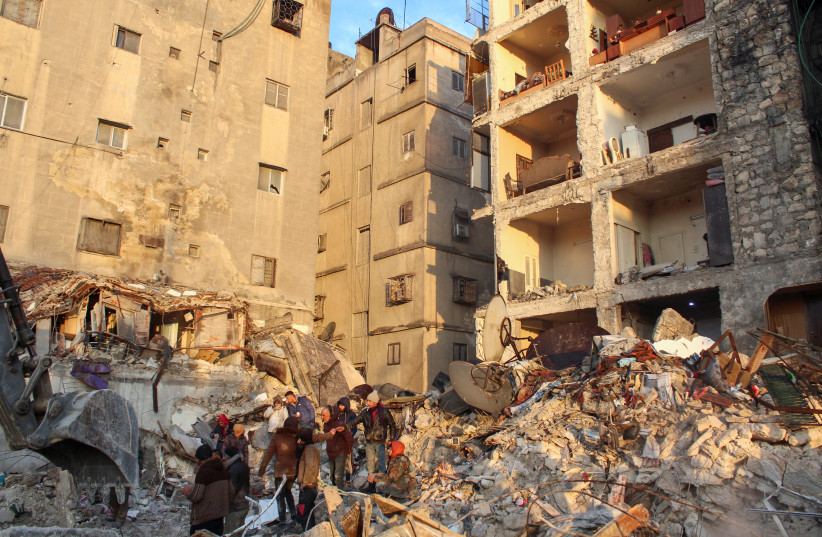Turkey, Syria earthquakes should be wake-up call for Israel - editorial

Netanyahu ordered National Security Council Director Tzachi Hanegbi to assess Israel’s preparedness for earthquakes.
Israel was one of the first nations to offer both Turkey and Syria aid and assistance following the devastating earthquakes there on Monday – even though Syria is an enemy state. As always, Israelis should be proud that their country is always among the first to lend a helping hand when disasters occur around the world, especially in this region.
Israel's aid to Turkey
An Israeli search and rescue team comprising some 150 experienced military officers, professionals and experts arrived in the Turkish city of Adana on Tuesday. “The IDF search and rescue team is fully committed to doing everything in its power to help save lives and provide support to those in need,” the IDF Spokesperson’s Office said.
President Isaac Herzog called Turkish President Recep Tayyip Erdogan to express condolences over the loss of so many lives.
“The State of Israel always stands ready to assist in every way possible,” Herzog said. “Our hearts are with the grieving families and the Turkish people at this painful moment.”
Prime Minister Benjamin Netanyahu said he had instructed all authorities to provide medical and rescue assistance to Turkey, adding that Israel is prepared to extend its aid to Syrian victims as well.
“I ordered to send, at the request of the Turkish government, rescue teams and medical aid,” Netanyahu said. “Since a request was also received to do this for many victims of the earthquake in Syria, I instructed to do this as well.”
As admirable as that outreach is, a big question in the aftermath of the regional disaster is whether back home, the country is ready for an earthquake.
Netanyahu ordered National Security Council Director Tzachi Hanegbi to assess Israel’s preparedness. Hanegbi will convene the discussion “at the earliest opportunity with the participation of all government ministries,” according to a statement from the Prime Minister’s Office.
Meanwhile, the Knesset’s Internal Affairs and Environment Committee chairman Yakov Asher called an urgent meeting of government ministries and emergency agencies next week to review the country’s readiness for an earthquake.
State Comptroller Matanyahu Englman urged authorities to fortify the country against a devastating earthquake, saying the disaster in Turkey and Syria should “turn on a bright warning light” to the government of Israel and the local authorities.
“Today, many in Israel felt the earthquake, and perhaps this is the last minute to make the proper preparations to prevent a disaster of this magnitude in our country,” Englman told 12th graders from Katzir High School in Rehovot who came to his Jerusalem office on Monday. “Instead of waiting for a commission of inquiry after a disaster, the government should act on pre-disaster preparedness.”
The National Emergency Authority (RAHEL) estimated that there are 80,000 dwellings in Israel that are at high risk if an earthquake hits. They are buildings built before regulations to fortify against quakes became required in the mid-1980s.
Official reports by the state comptroller and emergency services have predicted that there could be hundreds killed and thousands wounded if a powerful earthquake struck here. According to the reports, 28,600 homes could be seriously damaged and 170,000 people could be left homeless if a quake devastated communities such as Tiberias and Beit She’an in the North, which are situated along the seismically active Great Rift Valley.
The consensus among experts is that Israel is not prepared for an earthquake, which they say, is only a matter of time. Historically, the country has experienced severe quakes about once a century.
The last big one, sometimes called the Jericho earthquake, caused devastating damage and the loss of many lives and on July 11, 1927, while the strongest quake ever measured in Israel – with a magnitude of 7.23 – occurred on November 22, 1995, 100 km. south of Eilat.
In February 2022, the Geological Survey of Israel unveiled TRUAA, a system using cutting-edge technology capable of sensing the first signs of a quake, allowing the Home Front Command to send out an alert within 10 seconds. The name is purposefully reminiscent of the shofar’s staccato rings that serve as a wake-up call for Rosh Hashanah.
Let’s not wait for TRUAA to sound. Monday’s quakes should be a wake-up call for the responsible authorities to take measures now to minimize potential casualties in a future earthquake in Israel.
Jerusalem Post Store
`; document.getElementById("linkPremium").innerHTML = cont; var divWithLink = document.getElementById("premium-link"); if (divWithLink !== null && divWithLink !== 'undefined') { divWithLink.style.border = "solid 1px #cb0f3e"; divWithLink.style.textAlign = "center"; divWithLink.style.marginBottom = "15px"; divWithLink.style.marginTop = "15px"; divWithLink.style.width = "100%"; divWithLink.style.backgroundColor = "#122952"; divWithLink.style.color = "#ffffff"; divWithLink.style.lineHeight = "1.5"; } } (function (v, i) { });

